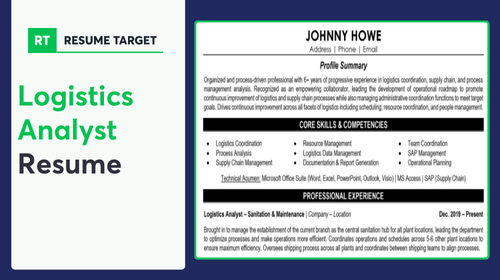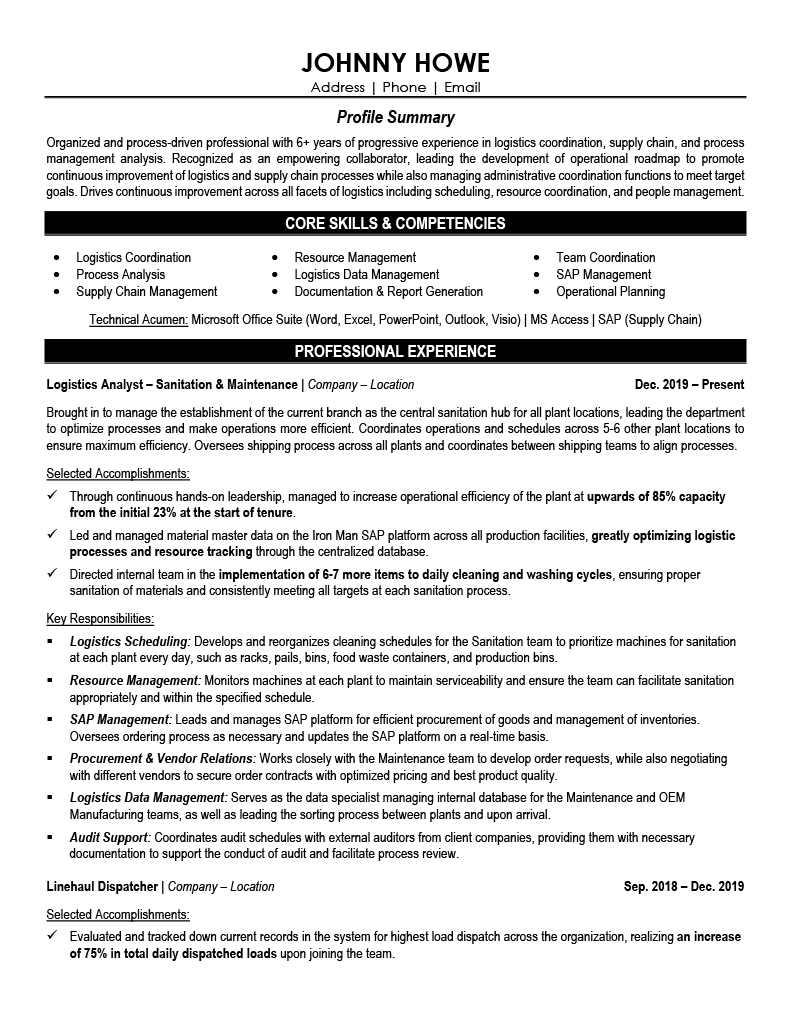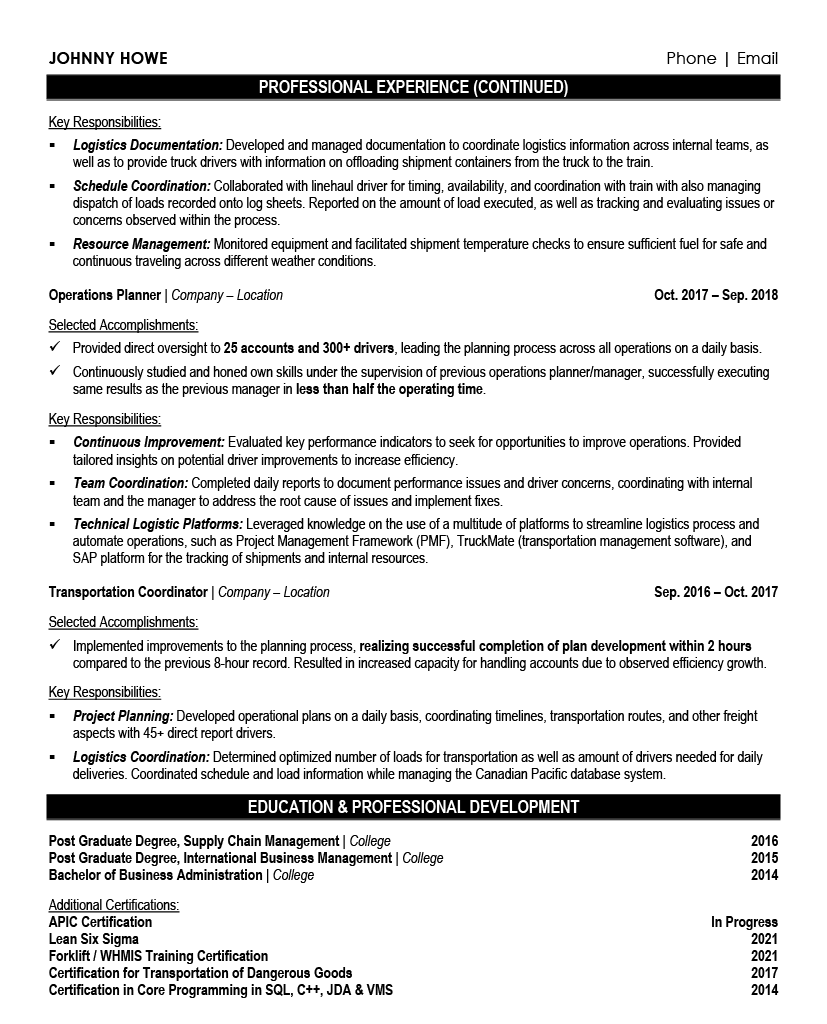

In the fast-paced world of supply chain, your complex achievements can get lost in translation. Numbers, systems, and process improvements often end up as bland bullet points that fail to capture your true impact.
Are you struggling to showcase how you've optimized operations and saved companies money? Your resume needs to transform technical logistics expertise into compelling success stories that hiring managers can't ignore.
Resume Target specializes in helping Logistics Analysts translate their supply chain victories into powerful career narratives. We'll help you craft a resume that clearly demonstrates your ability to streamline operations, reduce costs, and drive efficiency improvements that catch a recruiter's attention.


In today's fast-paced global marketplace, Logistics Analysts serve as the behind-the-scenes architects of efficient supply chains, where they're responsible for analyzing product delivery processes and recommending strategic improvements that can make or break a company's bottom line.
These supply chain professionals combine analytical expertise with problem-solving skills to optimize shipping schedules, track inventory flow, and maintain crucial logistics databases that keep goods moving smoothly from point A to point B.
Whether you're just starting out or looking to advance your career, the field of logistics analysis offers diverse opportunities for growth, from specializing in international shipping to leading supply chain innovation initiatives at major corporations.
Let's talk about what's exciting in the Logistics Analyst field! Your career path offers impressive earning potential across various industries, from federal government positions to manufacturing and wholesale trade. And guess what? While a bachelor's degree is typically preferred, you can enter this dynamic field even without prior experience and grow your earnings significantly as you gain expertise.
Figures from: U.S. Bureau of Labor Statistics
Starting as a Logistics Analyst opens doors to exciting advancement opportunities in supply chain management. Your career path can lead from analyst roles to executive positions, with each step building valuable expertise.
To accelerate your career growth, you'll need to master both technical expertise and leadership capabilities that go beyond basic analytical skills.
- Advanced Supply Chain Analytics - Enterprise Resource Planning (ERP) Systems - Project Management - Strategic Communication and LeadershipBreaking into logistics analysis typically starts with entry-level warehouse or supply chain positions, where you'll gain hands-on experience while developing crucial analytical and operational skills.
To advance in this field, you'll need to develop key competencies including analytical and problem-solving skills, which form the foundation for successful logistics analysis and strategic decision-making.
• Warehouse Associate • Inventory Clerk • Shipping/Receiving Coordinator • Supply Chain Coordinator • Operations Assistant • Data Entry Specialist • Transportation Coordinator • Distribution Center AssociateRequirements from ASCM
From Texas to Michigan, logistics analysts are in high demand across manufacturing hubs and major distribution centers.
Figures from U.S. Bureau of Labor Statistics
Struggling to showcase your supply chain expertise, data analysis skills, and operational improvements in a way that catches a hiring manager's attention? This comprehensive, section-by-section guide will walk you through creating a logistics analyst resume that highlights your most impressive achievements and capabilities.
If you're like most logistics analysts, condensing years of supply chain expertise, data analysis skills, and operational achievements into a few powerful sentences can feel as complex as optimizing an entire distribution network.
While you excel at streamlining processes and analyzing complex data flows, translating your ability to reduce costs and improve efficiency into compelling resume language requires a different kind of strategic thinking that hiring managers will immediately notice.
How would you describe your unique blend of analytical skills and supply chain expertise that sets you apart from other logistics professionals?
Reason: This helps you articulate your distinctive value proposition and professional identity, focusing on the intersection of technical and operational capabilities that are crucial in logistics analysis.
What are the primary logistics environments and supply chain scales you've worked with, and how do they shape your professional perspective?
Reason: This question helps frame your experience context and demonstrates your adaptability across different logistics scenarios, which is crucial for establishing credibility in your summary.
How do you combine your technical logistics tools expertise with business impact understanding when approaching supply chain challenges?
Reason: This helps you articulate your ability to bridge the gap between technical logistics analysis and business outcomes, showing potential employers you understand both the operational and strategic aspects of the role.
As a Logistics Analyst, you need to showcase both your analytical capabilities and your practical understanding of supply chain operations, from inventory management to transportation coordination.
Your resume should highlight technical proficiencies in logistics software (like SAP or Oracle SCM) alongside essential skills like data analysis, route optimization, and vendor relationship management that you use daily to keep operations running smoothly.
Showcase your supply chain expertise by organizing your work history into three powerful sections: a concise role overview that sets the stage, measurable achievements that highlight your operational improvements, and core responsibilities that demonstrate your logistics management capabilities.
Many Logistics Analysts struggle to translate their daily operational improvements and cost-saving measures into compelling resume achievements that capture attention. Transform your supply chain victories into powerful metrics by connecting each process improvement, vendor negotiation, and optimization effort to concrete business impacts like cost reduction, delivery time improvements, and inventory accuracy rates.
A strong responsibilities section demonstrates how Logistics Analysts optimize supply chain operations and drive business efficiency. Your duties should showcase both technical expertise and business impact while explaining complex logistics processes in terms that hiring managers can easily understand.
Your education and certifications demonstrate your expertise in supply chain management and logistics operations. Prioritize your most relevant credentials first, especially those focused on logistics management, inventory control systems, and supply chain analytics.
Now that you've built a strong foundation using Resume Target's proven resume writing guidelines, you're ready to transform your resume into a powerful tool for landing logistics analyst positions.
While many job seekers only customize their cover letters, tailoring your resume for specific logistics analyst roles is crucial for showcasing your relevant supply chain expertise, analytical capabilities, and industry-specific achievements.
A carefully customized resume not only helps you navigate through ATS systems by incorporating the right keywords, but it also demonstrates to hiring managers that your logistics experience and skills align perfectly with their operational needs and company culture.
Ready to stand out from other candidates? Let's turn your logistics analyst resume into a laser-focused document that proves you're the solution they've been searching for!
Don't let a lack of experience hold you back from launching your career as a Logistics Analyst!
Your previous work history might not scream "supply chain expert,"but your education, analytical skills, and relevant coursework or internships can make your resume stand out.
Focus on highlighting your data analysis abilities, knowledge of logistics software, and problem-solving capabilities to create a compelling resume.
For more guidance on structuring your entry-level resume, check out the Student Resume Writing Guide to ensure you're including all the essential elements.
Your resume summary is your chance to showcase how your academic excellence, internship experiences, and analytical skills make you an ideal candidate for a logistics role.
Focus on highlighting your understanding of supply chain principles, any relevant software proficiencies, and your proven ability to analyze data and improve processes.
"Detail-oriented and analytical professional with foundational experience in supply chain management through academic projects and internship experience. Proficient in SAP, Excel, and data visualization tools, with demonstrated success in reducing processing times by 15% during university warehouse management project. Strong mathematical aptitude and problem-solving skills developed through logistics coursework and hands-on inventory management experience. Seeking to leverage analytical capabilities and supply chain knowledge to optimize logistics operations and drive efficiency improvements."
Now's your chance to showcase how your academic background has prepared you for success in logistics and supply chain management!
Don't just list your degree - highlight relevant coursework like "Supply Chain Analytics"or "Transportation Systems,"and feature impactful projects where you used data analysis tools to optimize distribution networks or improve inventory management processes.
Insufficient data available despite thorough search.Relevant Coursework: Supply Chain Management | Operations Research | Transportation Systems | Inventory Management | Business Analytics | Project Management
Key Projects:
Supply Chain Optimization Simulation: Developed comprehensive analysis of a multi-channel distribution network to reduce operational costs and improve delivery times for a simulated retail company.
Warehouse Management System Enhancement: Collaborated with a team of four to design an improved inventory tracking system for a case study distribution center.
Transform your academic knowledge, internship experience, and technical training into a compelling skills section that showcases your readiness to excel in logistics analysis and supply chain operations.
As an entry-level Logistics Analyst, your combination of analytical skills and supply chain knowledge positions you perfectly for a field that continues to grow with the expansion of global commerce and e-commerce operations.
When you're juggling data analysis, supply chain metrics, and operational efficiency in your daily work, it's tough to step back and translate all those moving pieces into a compelling career story that hiring managers will actually understand.
At Resume Target, we specialize in crafting resumes for logistics professionals that clearly showcase your impact on operational efficiency and bottom-line results.
Our expert writers have helped countless logistics analysts transform complex KPIs and supply chain optimizations into powerful success stories that resonate with hiring managers across the industry.
With peak hiring season in logistics ramping up and companies urgently seeking analysts who can optimize their supply chains, now is the perfect time to elevate your resume - let's connect for a free consultation today.
Impress any hiring manager with our Logistics resume writing service. We work with all career levels and types of Logistics professionals.
Learn More → Logistics Resume Writing Services